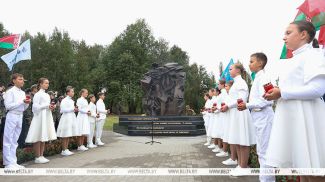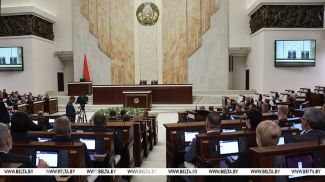MINSK, 19 March (BelTA) – A number of European experts have visited Belarus as part of the peer review of results of stress tests of the Belarusian nuclear power plant. The peer review final report will be made available to the general public in July 2018, the press service of the Belarusian Emergencies Ministry told BelTA.
The authorized European experts worked in Belarus on 12-16 March in order to review the country's national report on revaluating the safety (stress tests) of the Belarusian nuclear power plant. Seventeen experts from 15 countries led by Mark Foy, a representative of the UK Office for Nuclear Regulation (ONR), met with Belarusian and Russian specialists to discuss and clarify the information the national report contains. They visited the construction site near Ostrovets and prepared a preliminary version of the peer review report.
The visit of the European experts to Belarus is one of the stages in considering results of the Belarusian nuclear power plant stress tests as part of the peer review, which has been arranged in accordance with the commitments Belarus had undertaken voluntarily and in line with the procedure coordinated with the European Commission.
Olga Lugovskaya, Head of the Nuclear and Radiation Safety Department of the Belarusian Emergencies Ministry (Gosatomnadzor), stressed that as far as the development of the nuclear energy program is concerned, Belarus is a novice country. This is why the organization of stress tests represents not only a reliable tool for checking and verifying the safety of the nuclear power plant but also a point of growth with regard to the development of the technical competences of all the interested parties. Conclusions to be made as a result of the peer review will be of practical value for the development and consequent implementation of the measures designed to improve the safety and the ability of the Belarusian nuclear power plant to withstand natural phenomena. Olga Lugovskaya thanked all the experts for the great amount of work they had done, noting it had been difficult to accomplish considering the volume of information and the limited time for analysis.
The head of the expert group Mark Foy remarked that before the visit Belarus had quickly and in detail prepared answers to a large number of expert questions (465) and had sent them together with additional materials. Mark Foy went on saying that Belarus had been transparent and open in its interaction with the expert group, the visit had been well-organized, including the tour of the Belarusian nuclear power plant construction site.
According to the press service of the Belarusian Energy Ministry, the European experts went to the Belarusian nuclear power plant construction site on 14 March. The experts were made familiar with the nuclear power plant's information center in Ostrovets and went to see a number of facilities at the construction site itself. The delegation examined a reactor building, a turbine compartment, a safety control system, the power collection and distribution system, and other facilities. In the education and training center the experts were made familiar with how the nuclear power plant personnel is trained and held consultations with Belarusian specialists.
According to Deputy Energy Minister Mikhail Mikhadyuk, the Belarusian nuclear power plant design already implements additional technical solutions taking into account the events that resulted in the accident at the Fukushima nuclear power plant. Despite that Belarus had decided to arrange the stress tests in line with European Union methods for the sake of interests of Belarusian citizens and for bolstering the global safety culture.
The final version of the peer review report will be made available to the general public in July 2018 after the established procedures are fulfilled, including a visit of representatives of the peer review council to Belarus in June 2018.
Due to the accident at the Fukushima nuclear power plant in 2011 the European Union decided to arrange a comprehensive evaluation of risks and safety parameters (stress tests) of nuclear power plants in order to measure their ability to withstand extreme external impacts (for instance, an earthquake, flooding, a full or partial power outage, and the loss of the ultimate heat sink). Later on some countries outside the European Union, including Belarus, confirmed their intention to subject their own nuclear facilities to stress tests taking into account the universal approaches the European Union had suggested to this process.













